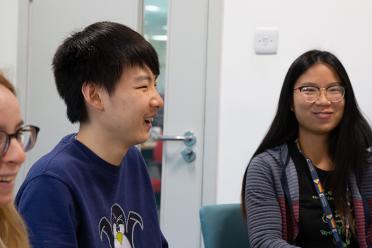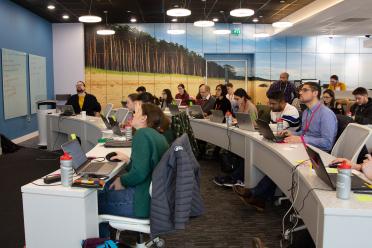10 (more) things you should know before starting a PhD
A while back, we asked some of our students to reflect on what they would like to have known before starting a PhD.
Their animated responses were boiled down into our essential listicle, 10 things you need to know before starting a PhD. Thousands of people have read it and, we hope, have been helped in their career journeys as a result.
But there were so many comments we couldn’t fit in, and plenty of new reflections that have arisen since. So, considering how important a decision it can be, we thought we’d give that article an update for 2023.
We spoke to our current students to find out some more of the things they think you should consider before embarking on this journey.
Many PhD students don’t consider the differences between a supervisor who works at a research institute or one who works at a university. There are advantages and disadvantages to both….and it’s worth thinking about this, depending on what you want to do with your PhD.
A supervisor based at an institute will usually have more time available to focus on research, rather than teaching undergraduates, and hopefully they’ll be more available for you. This can be ideal if you’re looking to move into research yourself.
On the downside, it may be more difficult for you to get any teaching experience. If that’s important to you, be sure to ask questions about the teaching opportunities available.



“You’re considering doing a PhD? You must be so smart!”
Almost every aspiring PhD student has heard a variation of this at some point, and it can easily lead to impostor syndrome: am I really clever enough to do this?
Yes. You are.
In terms of the level of understanding you need, anyone capable of completing an undergraduate degree could do a PhD. The question is whether or not you are suited to it, and the answer rests on other factors besides intelligence.
A PhD requires intense commitment, strength to recover from setbacks and overcome challenges, genuine interest in your research, and determination to finish.
It’s often seen as an endurance test - more of a marathon than the short sprints that make up the structure of many undergraduate degree courses.

Yes, we did indeed say this in the last article. But it bears repeating. It’s vitally important to make sure you choose the right supervisor and the right lab for you.
How do you work best? Do you like a lot of support and advice, or do you prefer to be left alone, knowing there’s someone you can go to with a problem? Do you want to be close friends with colleagues, or do you keep your work and personal lives separate?
Social media can also give you an idea of the characters in a group, though try to remember it offers a more selective snapshot - often without much-needed context and nuance around posts.
If you’re considering taking on a project, try to talk to the supervisor or members of the lab first. Make sure you ask someone who is doing a PhD - or has done a PhD - in the lab whether they’d recommend that group and supervisor.
Ask them how the supervisor works, how they treat students, what the lab culture is around socialising, and how people work together. Pay attention to what they say, and see whether it fits what you want.
Remember, it’s not just a question of a supervisor interviewing you for a position - you are also interviewing them.
A PhD is an opportunity not just to do research, but to learn new skills and grow in a professional environment.
There will almost always be more training available, and it will always be worth looking at. You don’t know where your PhD will take you, and picking up as much training and support as you can could be useful in the future.
The Earlham Institute’s Advanced Training courses are a great example, offering people both inside and outside the Institute access to a range of hands-on training courses and workshops using the latest tools, platforms, and approaches.

You’ll need to get very familiar with incomprehensible strings of capital letters during your PhD (doctorate of philosophy).
For example, if you’re doing a DTP funded by the BBSRC, where you’re going to need to find and arrange your own PIPS…you get the idea.
And that’s before we even get into all the science-based acronyms and initialisms you will encounter.
No-one knows what every acronym means in the first few months, and no-one expects you to know. You won’t be judged for asking - and you might find out something you didn’t know you needed to be aware of.
Who knows - as you get more familiar with your project, you might even start inventing a few of your own…?
Speaking of acronyms, a DTP is a Doctoral Training Partnership. Funding is usually provided by one of the UK Research Councils, designed to train the next generation of researchers.
Studying for a PhD is expensive. Unless you’re lucky enough to have a generous benefactor, you will need to acquire some form of funding.
There are several kinds available, but a DTP support package usually includes full fees, an annual stipend, and a research training support grant.
Whatever your financial position, be sure to ask about help and support so you know what’s available should your circumstances change.
A PhD is a huge commitment and, if you’re not careful, it can start to consume all of your time. But finding that work-life balance is vital.
Giving your brain a bit of downtime and coming back to your work with fresh eyes is often the key to solving a problem.
You are also more than just your work - you’re an individual, with interests, passions, and relationships. These need some of your time and attention.
And who better to get to know, in an unfamiliar place with unfamiliar people, than the rest of your PhD cohort? They’re in the same position as you - and these are the friendships that are going to help you when the pressure mounts up.
It’s not a deal breaker… but consider what kind of place you’ll be happy living in. For example, if you’re a confirmed city-dweller who requires your daily flat white to be meticulously constructed by a barista, and you’re only comfortable when lots of other people are around, a PhD involving months by yourself on an island off the west coast of Scotland might not be a good fit.
And some of us have non-negotiable life needs. If you have a medical condition, think about how you’re going to get hold of treatment; or if you have children, where they’ll go to school.
Of course, for the right project or lab, a trade-off can be made - but do think about what you can and can’t compromise on. What do you need to have access to? What do you want to have access to? How far away will you be from your partner/family/best friend/cat (delete as applicable) and is that acceptable?
We won’t hear a bad word said about Norwich but do recognise it’s not for everyone. The more you know in advance, the more informed your decision will be.

The temptation is to assume that applying for PhDs happens at the same timings as applying for UCAS, but a PhD is not a degree course. You need to think about PhDs much earlier - in the autumn, not spring.
While some opportunities are available year round, the majority of PhD application deadlines are between late December and mid January, matching the Research Council funding deadlines.
This means, if you want to start your PhD straight out of University, you will need to begin the searching and application process in the first months of your final year.
Lastly - but definitely not least - make sure you check out any PhDs we’re offering here at the Earlham Institute!
The Institute is a multidisciplinary and highly collaborative organisation conducting research across a number of fields. We’re based at Norwich Research Park, a bioscience and biotechnology hub which will offer you plenty of future opportunities in your field as well as the chance to work on world-beating science.
And as for the location? Norfolk is outstandingly beautiful, and Norwich is a cultured and diverse city which can offer you a wide variety of interesting ways to pass your free time (as well as several decent flat whites).
By making a considered choice about your PhD - where you’ve used and acted on our two articles - you put yourself in a great position to thrive during a PhD. And, when things aren’t going so well (failed experiments, beaten by another research group, etc) you have that much more resilience because you know the people and the place are right for you.
Applications for the NRPDTP open early October. Keep an eye out for projects here.